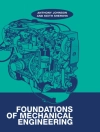This book focuses on the design of the in-car human–machine interface (HMI) and the design-relevant psychology. It combines a design perspective with an applied theoretical perspective. The design perspective informs the reader about how to set up a design process that puts users at the centre of the design process. The theoretical perspective provides the reader with an understanding of concepts from perception and cognitive psychology, supporting the decision-making in the design process.
This is an ideal book for automotive engineers and practitioners in the automotive industry who face the challenge of designing information and entertainment systems, advanced driver assistance systems (ADAS) and automated driving systems (ADS), and the associated HMIs.
Innehållsförteckning
Introduction.- Introduction to Interaction Design.- Basic Psychology.- Mental Load and Fatigue.- Situation Awareness, Multi-tasking and Distraction.- User Experience.- Driving Behaviour and Changing Behaviour.- Interaction Design Theory.- User Interface Design.- Design Process
Om författaren
Dr. Fang Chen’s main research area includes cognitive science, interaction design and human–machine interaction, with theoretical background involving physiology, behavioural psychology, visual and auditory interaction. Her researches were widely applied in multimedia system usability, automatic control, aviation and automobile driving control, public safety and crisis management and were adopted by the EU as the basis for the formulation of relevant standards for transportation and vehicles. As an expert in interaction design, she serves as a member and consultant to several international academic research institutions, and published hundreds of papers in international journals and conferences.
Dr. Fang Chen is a tenure professor of Chalmers University of Technology, Sweden. She has been Ph D student supervisor at Tsinghua University and cooperated with Tongji University and Zhejiang University. She was employed as senior consultant for Huawei for three years. She currently works for the Department of Product and Project Management, First Automobile Work, as Senior Director.
Dr. Jacques Terken was an associate professor in the Department for Industrial Design at Technische Universiteit Eindhoven, the Netherlands, until his retirement in 2018. He graduated from Utrecht University in 1979, specializing in Cognitive Psychology/Psycholinguistics, and holds a Ph D from Leyden University (1985). He worked at the Institute for Perception Research at Eindhoven University of Technology. In 2001 he joined the Department for Industrial Design of Eindhoven University of Technology. He has worked in the area of speech technology and human–technology interaction. Since a number of years, his research focuses on automotive human factors. His research interests include the user experience for autonomous vehicles, and methods for evaluating design concepts in the early phases of the design process. He has supervised a number of Ph D projects inthe area of human–human and human–machine communication, and in the area of automotive human factors. He is the (co-)author of over 160 scientific papers covering topics such as the use of speech in the interface, user-centred design and evaluation, and automotive human factors, (including several best paper awards), covering topics such as the use of speech in the interface, user-centred design and evaluation, and automotive human factors.












